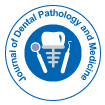Unsere Gruppe organisiert über 3000 globale Konferenzreihen Jährliche Veranstaltungen in den USA, Europa und anderen Ländern. Asien mit Unterstützung von 1000 weiteren wissenschaftlichen Gesellschaften und veröffentlicht über 700 Open Access Zeitschriften, die über 50.000 bedeutende Persönlichkeiten und renommierte Wissenschaftler als Redaktionsmitglieder enthalten.
Open-Access-Zeitschriften gewinnen mehr Leser und Zitierungen
700 Zeitschriften und 15.000.000 Leser Jede Zeitschrift erhält mehr als 25.000 Leser
Indiziert in
- Google Scholar
- ICMJE
Nützliche Links
Open-Access-Zeitschriften
Teile diese Seite
Abstrakt
The fear of dentistry and receiving dental care is commonly known as Dentophobia or dental anxiety
Pranaj Dewan
Dentophobia, also referred to as dental anxiety, is a prevalent psychological phenomenon characterized by an intense and irrational fear of dental procedures and receiving dental care. This fear can result in significant distress and avoidance behaviors, leading to compromised oral health and well-being. Individuals with dentophobia often experience heightened levels of stress, apprehension, and physiological reactions when faced with the prospect of visiting a dentist or undergoing dental treatments. Dentophobia can stem from various sources, including negative past experiences, fear of pain, feelings of helplessness and loss of control, and cultural influences. The impact of dentophobia extends beyond the realm of oral health, affecting individuals' overall quality of life and self-esteem. As a result, it becomes crucial for dental professionals to adopt patient-centered approaches that prioritize comfort, communication, and gradual desensitization techniques to alleviate the fears associated with dental care. Efforts to address dentophobia involve a combination of psychological interventions, such as cognitive-behavioral therapy and relaxation techniques, along with advancements in dental technology that minimize discomfort and pain during procedures. Additionally, providing comprehensive information to patients about treatment procedures and options can empower them to make informed decisions and reduce anxiety. Highlights the significance of understanding dentophobia as a common barrier to oral health care and emphasizes the importance of creating a supportive and empathetic environment within the dental setting. By recognizing the multifaceted nature of dentophobia and implementing strategies to mitigate its impact, dental professionals can contribute to improved oral health outcomes and overall well-being for their patients.
Zeitschriften nach Themen
- Allgemeine Wissenschaft
- Biochemie
- Chemie
- Genetik und Molekularbiologie
- Geologie und Geowissenschaften
- Immunologie und Mikrobiologie
- Klinische Wissenschaften
- Krankenpflege und Gesundheitsfürsorge
- Landwirtschaft und Aquakultur
- Lebensmittel & Ernährung
- Maschinenbau
- Materialwissenschaften
- Medizinische Wissenschaften
- Pharmazeutische Wissenschaften
- Physik
- Sozial- und Politikwissenschaften
- Umweltwissenschaften
- Veterinärwissenschaften
Klinische und medizinische Fachzeitschriften
- Anästhesiologie
- Augenheilkunde
- Betrieb
- Dermatologie
- Diabetes und Endokrinologie
- Gastroenterologie
- Genetik
- Gesundheitspflege
- Immunologie
- Infektionskrankheiten
- Kardiologie
- Klinische Forschung
- Medizin
- Mikrobiologie
- Molekularbiologie
- Neurologie
- Onkologie
- Pädiatrie
- Pathologie
- Pflege
- Toxikologie
- Zahnheilkunde

 English
English  Spanish
Spanish  Chinese
Chinese  Russian
Russian  French
French  Japanese
Japanese  Portuguese
Portuguese  Hindi
Hindi